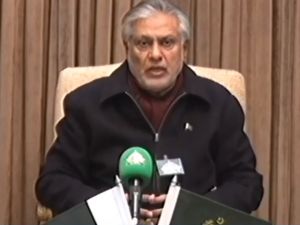The government has increased the price of gasoline by Rs35.
The Minister of Finance has stated that fuel will be supplied at its new cost beginning at 11 am and has refuted rumours of a shortfall of petroleum products.

Ishaq Dar, the finance minister, said that the price of gasoline and diesel would rise by 35 rupees per litre as of Sunday morning at 11 a.m.
In a brief televised speech to the country today, the minister made the statement and insisted that the price of light fuel and kerosene had increased by Rs18 per litre.
Dar denied allegations of a fuel shortfall and asserted that these shortages were being produced “artificially.”
There is enough of petroleum available, and under normal circumstances, such limitations wouldn’t be necessary, he said.
He continued, “Unfortunately, it created an incentive for them [hoarders] because on social media it was stated that [fuel prices] were to be increased by Rs47-80. As a result, we have heard tales of false shortages in the market.”
It should be recalled that Dar had previously said that fuel prices would stay the same for the second half of the month, or until January 31, as of January 15.
Petroleum will now cost Rs249.80 per litre with today’s price increase, while diesel prices will now cost Rs262.80 per litre, kerosene oil will cost Rs189.83 per litre, and light diesel oil will cost Rs187 per litre.
Pakistan is anticipated to narrowly avoid defaulting on its foreign payments despite the nation’s chronic inflation after the International Monetary Fund (IMF) eventually decided to continue talks under the ninth Extended Fund Facility (EFF) review.
However, the breakthrough was only acknowledged when Prime Minister Shehbaz Sharif unequivocally said that his administration was prepared to make all the necessary choices to resurrect the $6.5 billion IMF programme.
By allowing market forces to set the rupee-dollar exchange rate, the government has satisfied the first of the four major precursor conditions that had to be satisfied in order to restart the lending programme.
As a result, on Thursday in the interbank market, the local currency fell by Rs24.54 (or 9.61%) to an all-time low of Rs255.43 versus the US dollar.
As one of the four requirements outlined by the IMF, the government surrendered its control over the rupee-to-dollar exchange rate, which led to the most recent decline.
The significant decrease in the exchange rate may raise petroleum products (POL) costs by up to 50% in the weeks and months to come, according to Ismail Iqbal Securities Head of Research Fahad Rauf, who was speaking to The Express Tribune. Going forward, a sales tax of 17% is also levied on POL goods in addition to the petroleum development levy, which is fixed at Rs. 50 per litre on gasoline and diesel, respectively.
Fuel costs are expected to rise by 44% to Rs309/litre for gasoline and by 50% to Rs341/litre for diesel.
Additionally, due to the rupee’s nearly 10% decline against the dollar on Thursday, the cost of all imported items will increase by an extra 10%. Food (wheat, wheat flour, pulses, and cooking oil), cotton for textiles, steel scrap, and energy items will be among these products (oil, gas and coal).
However, the average person will be worst hurt by the rising cost of necessities, especially those from lower socioeconomic classes who were already having difficulty as a result of the continuous political and financial unrest.










































